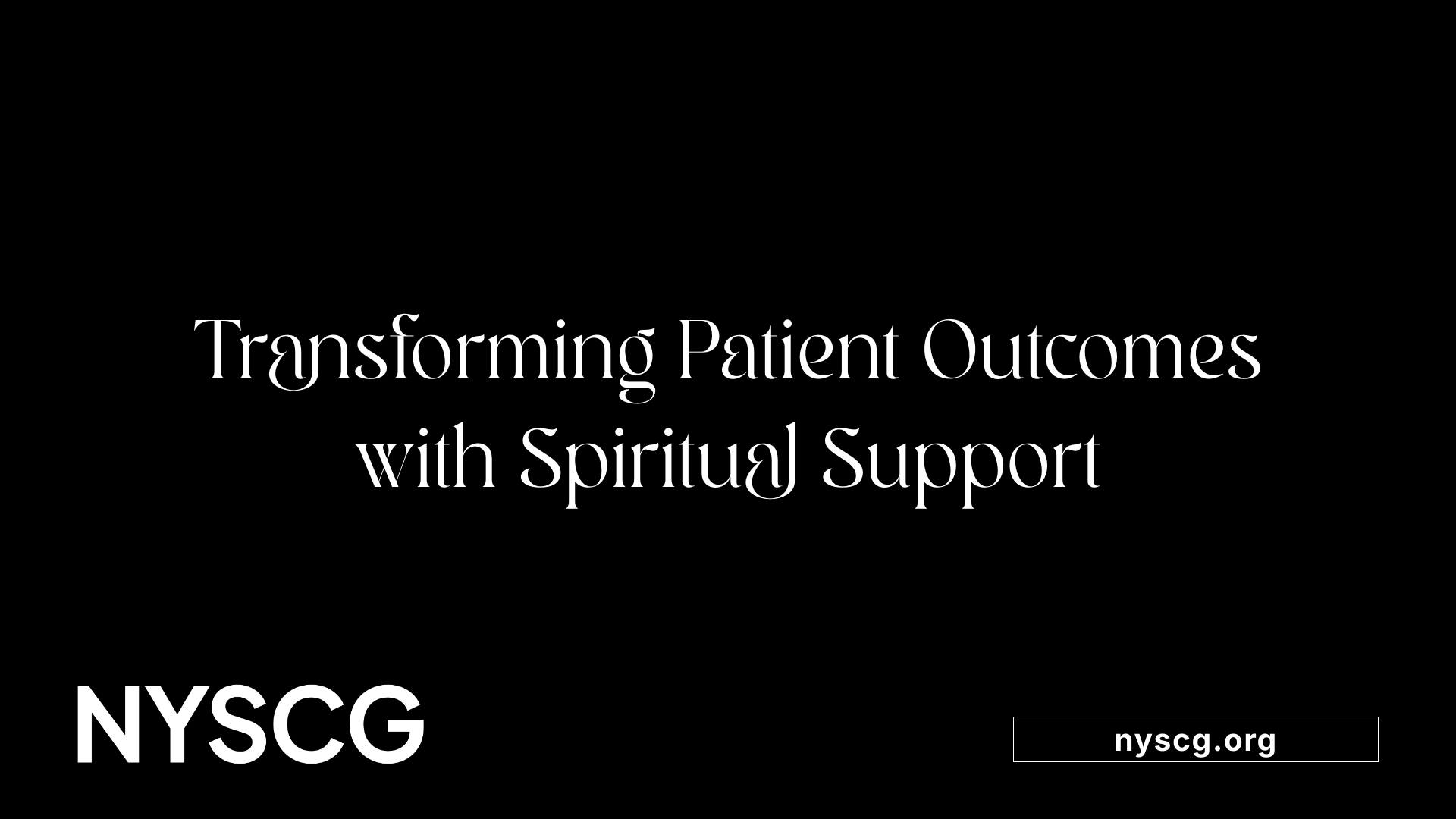How Spiritual Care Consultants Help Hospitals and Clinics


Spiritual care consultants, often called chaplains, are vital members of healthcare teams who provide holistic support to patients, families, and staff. Their work extends beyond traditional medical treatment, addressing deeper existential and emotional needs that influence recovery, well-being, and quality of life. This article explores how these professionals support hospitals and clinics in nurturing spiritual health, fostering resilience, and improving overall healthcare outcomes.

Spiritual care consultants, including specialized chaplains and spiritual health practitioners, play a crucial part in supporting the overall well-being of patients, families, and healthcare providers. Their primary focus is to address emotional, psychological, and spiritual needs that arise during illness or crisis.
They provide personalized interventions such as conducting spiritual assessments to understand individual beliefs and needs, offering counseling sessions to explore issues of suffering, hope, and purpose, and facilitating religious or spiritual rituals that may bring comfort. Therapies such as guided visualization, prayer, or ritual practices are often used to promote healing, acceptance, and peace.
These professionals work closely with interdisciplinary medical teams to ensure that spiritual considerations are integrated into patient care plans. They also help develop policies and allocate resources aimed at enhancing spiritual support within healthcare environments.
As advocates, they guide patients through complex situations involving faith, end-of-life decisions, and existential questions. By serving as cultural and faith-based mediators, they help create a supportive space where diverse beliefs are respected.
Ultimately, the work of spiritual care consultants fosters a holistic approach to health—improving patient satisfaction, supporting emotional resilience, and contributing to better health outcomes. Their presence in hospitals and clinics underscores the importance of addressing spiritual needs as part of comprehensive healthcare.
Spiritual care professionals, such as chaplains, play a vital role within hospital and outpatient environments, offering a broad range of services aimed at supporting patients’ spiritual and emotional needs. One of their primary functions is conducting spiritual assessments to understand each patient’s unique beliefs, concerns, and resources. This allows them to provide personalized counseling that addresses issues of suffering, grief, hope, and the search for meaning.
In addition, they facilitate religious and spiritual practices such as prayer, sacraments, rituals, and sacred ceremonies. These services help patients connect with their faith traditions and foster a sense of peace and comfort during difficult times.
Spiritual care providers also assist with care planning and decision-making, supporting patients as they navigate complex healthcare choices. They help explore ethical concerns and facilitate communication between patients, families, and medical teams, ensuring spiritual considerations are integrated into treatment.
Beyond individual support, chaplains often create peaceful environments like contemplation or prayer rooms, offering a quiet space for reflection and spiritual reflection. They may also connect patients with community faith leaders for specific religious rites or support, including arranging for clergy visits or sacraments.
Supporting patients through suffering, loss, hope, and questions about life’s purpose remains central to their role. They help patients find new sources of strength or peace through guided visualization, rituals, or conversations that promote forgiveness, acceptance, and integrity.
Hospitals recognize the importance of addressing spiritual needs as part of comprehensive care. Consequently, many provide spaces for contemplation and prayer, and assign trained professionals to serve as a bridge to spiritual resources.
Altogether, these services contribute to holistic patient care, respecting diverse backgrounds and beliefs to improve overall well-being during health crises.
For further information, searches such as “Hospitals spiritual care services,” “chaplain interventions,” and “patient support programs” can offer additional insights into the scope and availability of spiritual care.
| Service Type | Description | Resources and Examples |
|---|---|---|
| Spiritual assessments | Evaluating spiritual needs | Religious background, belief systems |
| Counseling | Emotional and spiritual support | Personal conversations, grief work |
| Religious services | Prayer, sacraments, rituals | Holy text readings, holy days observance |
| Care planning | Incorporating spiritual resources | Ethical concerns, decision-making |
| Environment creation | Peaceful spaces | Contemplation rooms, prayer areas |
| Community connection | Faith leader engagement | Clergy visits, prayer list inclusion |

Spiritual care plays a vital role in supporting the emotional and psychological well-being of patients and their loved ones. It helps individuals find meaning, hope, and comfort during challenging times, especially when facing serious illness or end-of-life decisions.
By addressing not just physical symptoms but also emotional, social, and spiritual needs, spiritual care supports holistic healing. This comprehensive approach can lead to better health outcomes, such as reduced pain, increased satisfaction with care, and improved ability to cope with illness.
Involving trained chaplains and spiritual care providers fosters a trusting environment. Patients report feeling more satisfied with their care when their spiritual needs are acknowledged and supported. It also helps healthcare teams make more informed and compassionate medical decisions.
For healthcare staff, integrating spiritual care enhances the caregiving experience. It promotes a deeper connection with patients and families, reduces disparities by ensuring everyone’s spiritual needs are recognized, and strengthens the overall quality of healthcare.
Ultimately, spiritual care supports the well-being of all involved by creating a space where emotional, spiritual, and physical health are addressed together, leading to a more compassionate, effective healthcare experience.

Spiritual care plays a vital role in fostering the overall health of patients by addressing more than just the physical aspects of illness. It focuses on emotional, spiritual, and existential needs that influence how individuals cope with health challenges, recover, and find meaning in their experiences.
Chaplains and spiritual care providers help patients explore their beliefs and values, which can strengthen resilience and create a sense of purpose during difficult times. This holistic approach supports improved quality of life and can positively impact medical decisions, as patients feel more connected to their inner selves and their faith traditions.
By engaging patients in open, judgment-free conversations about their spiritual needs, healthcare providers can reduce feelings of disconnection and distress. Incorporating spirituality into healthcare recognizes its significant influence on health outcomes, such as reducing depression, alleviating pain, and potentially increasing longevity.
Spiritual care encourages patients to find comfort and hope through various expressions, whether through religious rituals, prayer, or other spiritual practices like music, nature, or community service. It supports recovery not solely in physical terms but by strengthening emotional resilience and nurturing a sense of peace.
Ultimately, holistic healing involves caring for the whole person—body, mind, spirit, and social connections—leading to more comprehensive and compassionate patient care that promotes well-being across all aspects of life.

Spiritual care in healthcare is guided by core principles that emphasize respect for diverse beliefs, confidentiality, and a compassionate, patient-centered approach. These principles ensure that each patient receives support aligned with their unique spiritual, cultural, and religious backgrounds.
Fundamentally, spiritual care aims to provide emotional and spiritual support that helps patients find meaning, purpose, and peace in the face of illness or life's challenges. It recognizes the importance of addressing not only physical health but also emotional, social, and spiritual well-being.
A primary goal is to assist patients in coping with distress, fears, doubts, or feelings of disconnection that often accompany serious health conditions. Through active listening and sensitive engagement, healthcare providers and spiritual care professionals work to foster acceptance, resilience, and a sense of inner peace.
Collaboration with faith leaders or spiritual guides when appropriate enhances the support provided. Spiritual assessments are used to understand each patient’s beliefs and needs, guiding tailored interventions that respect individual dignity and autonomy.
Incorporating spiritual resources—such as prayer, rituals, or reflection—into treatment helps create a holistic approach to care. Ultimately, spiritual care strives to honor each person's dignity, bolster their coping strategies, and improve their overall quality of life by integrating spiritual considerations into their healthcare journey.
| Principles | Goals | Approach |
|---|---|---|
| Respect for diverse beliefs | Support spiritual, emotional needs | Use of spiritual assessments |
| Confidentiality | Enhance coping and resilience | Collaboration with faith leaders |
| Compassionate presence | Promote acceptance and peace | Active, empathetic listening |
| Patient-centeredness | Ensure dignity and autonomy | Tailored spiritual interventions |
| Cultural sensitivity | Foster hope and purpose | Inclusive, non-proselytizing support |
This holistic approach highlights the importance of recognizing each patient's unique spiritual identity as part of comprehensive healthcare.
What interventions and practices are used by spiritual care providers in healthcare settings?
Spiritual care providers employ diverse interventions designed to meet the unique spiritual and emotional needs of each patient. These include conducting spiritual assessments to understand patients' beliefs and concerns, and offering counseling that respects their individual faiths or spiritual orientations.
In addition to talk-based support, spiritual care professionals facilitate religious rituals, prayer, and sacred ceremonies tailored to the patient’s tradition. These practices help provide comfort, foster a sense of connection, and support coping with illness or grief.
Beyond religious acts, many healthcare providers integrate complementary therapies like music, art, guided imagery, healing touch, and massage. These methods aim to promote relaxation, reduce anxiety, and support emotional healing.
Interactions typically combine physical, emotional, and spiritual elements. For example, a chaplain might listen compassionately, offer spiritual rituals, arrange visits from faith leaders, or guide patients in meditation and visualization exercises.
The goal of these interventions is to enhance overall well-being, reduce feelings of despair, build hope, and foster a sense of peace. They are often delivered as part of interdisciplinary care teams, emphasizing cultural sensitivity and personalized approaches.
Many institutions emphasize training healthcare staff to recognize spiritual distress and incorporate basic spiritual care skills. This ensures that each patient’s spiritual needs are appropriately addressed and that they are connected with specialized spiritual care providers when necessary.
Research in spiritual care continues to explore effective tools and methods. Studies look at how interventions like music therapy, guided imagery, and healing rituals impact patient outcomes, emphasizing their role in holistic healing and quality of life improvement.
By integrating these practices into standard care, healthcare systems can offer comprehensive support that nurtures the spiritual dimension of health alongside physical and emotional care.
 Spiritual care plays a vital role in enhancing various aspects of patient health and the overall effectiveness of healthcare services. When patients receive support that addresses their spiritual needs, it often leads to better treatment adherence, increased satisfaction, and more positive recovery experiences.
Spiritual care plays a vital role in enhancing various aspects of patient health and the overall effectiveness of healthcare services. When patients receive support that addresses their spiritual needs, it often leads to better treatment adherence, increased satisfaction, and more positive recovery experiences.
Patients facing serious illnesses frequently experience suffering, anxiety, and emotional distress. Through compassionate listening and spiritual support, chaplains and healthcare providers help alleviate these burdens. They provide a safe space for patients to process fears about death, doubts about beliefs, and feelings of disconnection, contributing to a sense of peace and acceptance.
Supporting patients’ spiritual beliefs also influences informed decision-making and ethical considerations. Spiritual care assists patients in understanding their options, clarifying values, and making choices that align with their beliefs, which is especially important in end-of-life care.
Research indicates that integrating spiritual interventions into healthcare can produce tangible health benefits. Patients who engage in spiritual practices such as prayer, rituals, or guided visualization often report reduced suffering and anxiety. These interventions may even support physiological health, such as lower blood pressure or improved immune responses.
The connection fostered through spiritual care promotes a sense of belonging and purpose. Patients feel more connected to their communities, faith traditions, or personal sources of hope. This sense of connection not only improves their emotional state but also enhances their resilience and overall health outcomes.
Below is a summary of the ways spiritual care impacts hospital settings:
| Aspect | Impact | Additional Details |
|---|---|---|
| Treatment adherence | Improved | Patients with spiritual support are more likely to follow prescribed treatments |
| Patient satisfaction | Increased | Spiritual care fosters trust and emotional comfort |
| Recovery | Enhanced | Holistic care that includes spirituality supports physical healing |
| Emotional well-being | No cost | Helps reduce suffering, anxiety, and feelings of disconnection |
| Physiological benefits | Evidence-supported | Moderate improvements in blood pressure, immune function |
| Connection | Strengthened | Builds meaningful bonds with faith communities and loved ones |
Incorporating spiritual care into healthcare practices enhances patient outcomes by addressing the holistic needs of individuals. As more institutions recognize its value, spiritual support becomes an integral part of delivering compassionate, patient-centered care that benefits both the mind and body.
Incorporating spiritual care consultants into healthcare environments enriches the healing process by addressing the often-overlooked emotional and spiritual dimensions of illness. These professionals not only support the holistic health of patients but also strengthen the resilience of families and the well-being of healthcare staff. Their diverse interventions—ranging from assessments and rituals to ethical guidance—help foster a compassionate and inclusive environment where every individual’s dignity is upheld. As research underscores the profound benefits of spiritual care, more hospitals and clinics are recognizing its indispensable role in advancing holistic, patient-centered care. Ultimately, spiritual care consultants serve as vital collaborators, advocates, and sources of comfort, ensuring that healthcare remains attentive not just to the body but to the whole person—mind, body, and spirit.
All you need is the will to make the world a better place.
New York State chaplain group inc. is a tax deductible organization with a federal tax Id number 92-383-4921